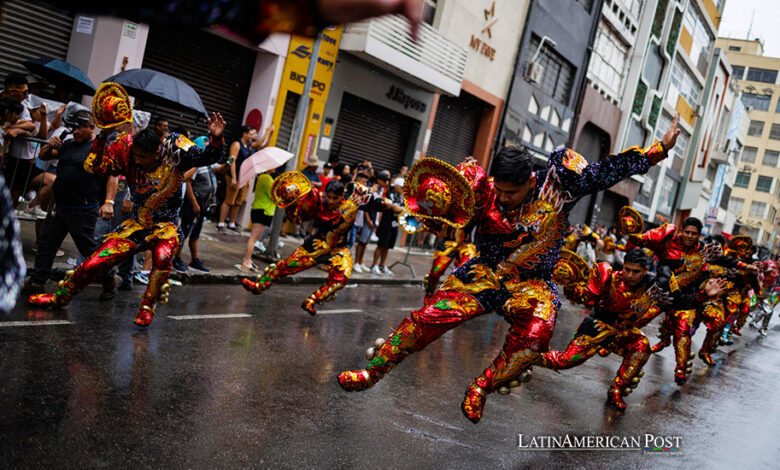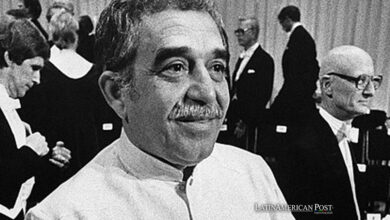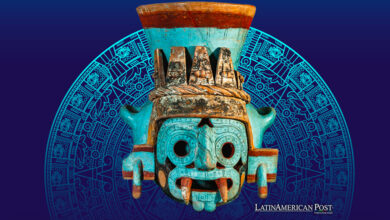Carnival with Andean Flair as Bolivian Community Celebrates Cultural Pride in São Paulo

Amid São Paulo’s vibrant Carnival festivities, the Bolivian community takes to the streets, showcasing their rich Andean culture through traditional dance and attire, challenging stereotypes, and embracing their heritage with newfound confidence.
Bolivian Carnival in São Paulo: A Unique Cultural Celebration
A unique celebration unfolds in the bustling streets of São Paulo’s Bom Retiro neighborhood, known for its clothing stores and as a stronghold of the Bolivian community. It’s Carnival time, but not as Brazil typically knows it. Here, the rhythmic beats of samba give way to the haunting melodies of the Andean flute as Bolivians in Brazil’s largest city come together to honor their rich cultural heritage.
This Sunday, the community, which constitutes the city’s largest migrant group with around 100,000 members, paraded through Bom Retiro, transforming the neighborhood into a vibrant tableau of Andean culture. Amid the festivities, Norah Gamboa, a 64-year-old Bolivian dressed in a black skirt embroidered with flowers, stood out as the matriarch of the Waka Waka dance troupe—a colonial-era dance where women, dressed as milkmaids, playfully outmaneuver bulls represented by men.
Gamboa, one of the founders of this folkloric association that has been parading since 2007, shared with a laugh how the community’s attitude has evolved from hiding their traditional attire to wearing it proudly. “Before, we used to hide; we were ashamed to wear our typical clothes on the subway… Now we are more shameless,” she told EFE, her Spanish peppered with Portuguese words.
Journey from Cochabamba to São Paulo
Her journey to Brazil, alongside her husband, began in the late ’70s from Cochabamba amid Brazil’s military dictatorship (1964-1985). While her husband validated his medical degree, Gamboa embarked on her entrepreneurial venture with a women’s clothing business on the outskirts of São Paulo.
Despite ongoing prejudices, the Bolivian community in São Paulo has grown in confidence. The children of migrants born in Brazil navigate their dual identities effortlessly and without fear. Thiago Villarroel, a 35-year-old doctor and Gamboa’s son, embodies this evolution. Though he primarily speaks Portuguese, reserving Spanish for jokes, he has embraced folkloric dance from a young age. “When I started dancing, I felt proud of my roots… You feel special,” he remarked before donning his bull costume.
Ana Camacho, a 35-year-old nutritionist born in Brazil, shared her excitement and nerves about participating in her first parade, supported by her boyfriend who, despite not having Bolivian roots, joined to back her. “It’s good to remember the culture and keep it alive,” she said, her head adorned with a colorful orange mantilla.
Preserving Culture Amid Racial Discrimination
However, Camacho’s Brazilian birth and fluent Portuguese have not shielded her from racial discrimination. She recalled a recent instance where she and her mother were blatantly ignored at a local restaurant. “You wonder: Is this happening to me? I hope it’s the last time,” she stated, her tone turning serious.
The community’s spirit soared as the Andean flute began to play from a car draped in Bolivian fabric, signaling Camacho and her boyfriend to take their places in the parade. Led by the Virgen del Socavón and with neighbors watching from their windows, the Bolivian milkmaids danced through the streets, their colorful skirts twirling against the backdrop of faux bulls, symbolically conquering Brazil just as they have conquered their struggles in a foreign land.
Also read: Rock Album Category Ends in Historic Tie at Grammy Award
This Carnival celebration in São Paulo is more than a display of cultural pride; it’s a testament to the resilience and integration of the Bolivian community in Brazil. Through music, dance, and traditional attire, they preserve their heritage and challenge the stereotypes and prejudices that have long shadowed their presence in Brazil. Amid the country’s biggest party, the Bolivians of São Paulo have carved out a space to celebrate their identity, showcasing the diversity that enriches Brazil’s cultural tapestry.





